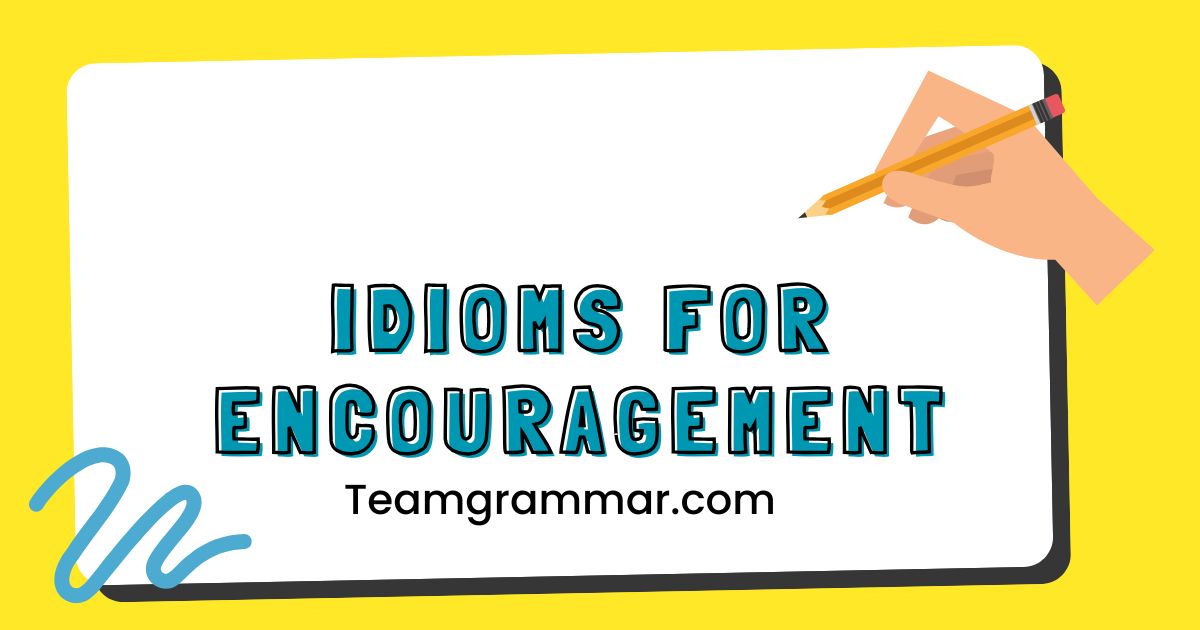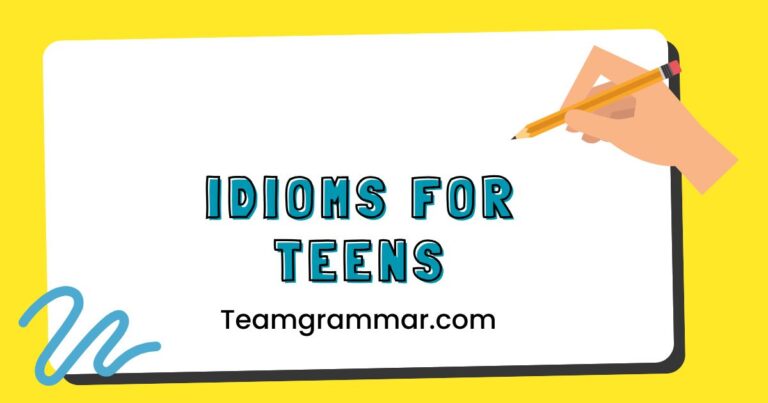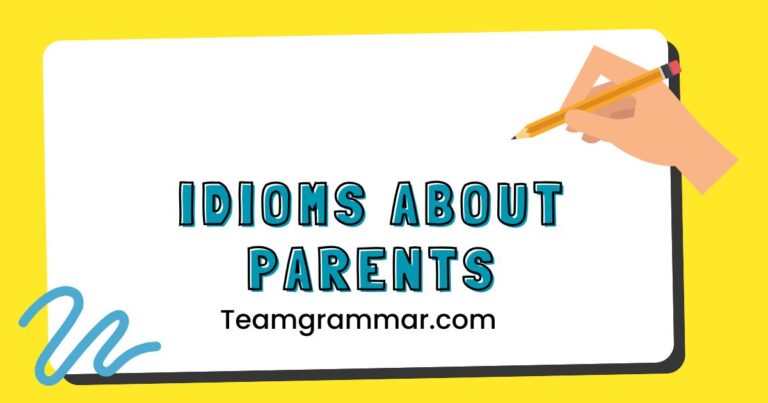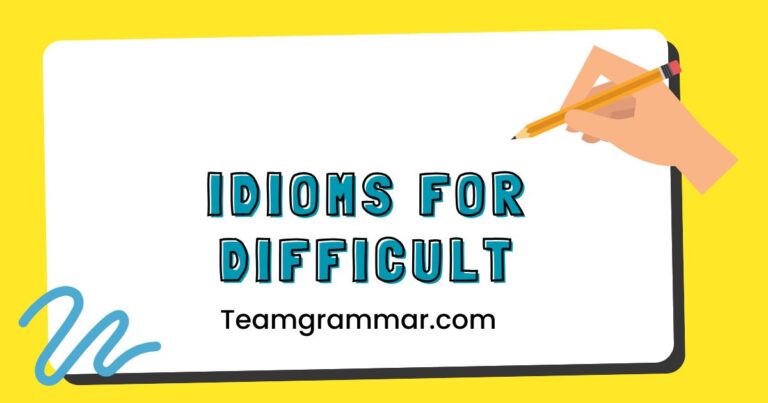47 Idioms for Encouragement: Supporting Others with Figurative Language
Understanding and using idioms related to encouragement is crucial for effective communication and building strong relationships. These expressions add depth to our language, allowing us to convey support, empathy, and motivation in a more nuanced and relatable way.
Mastering these idioms enhances both comprehension and expression, making you a more effective communicator. This article is designed for English language learners, educators, and anyone interested in expanding their understanding and use of idiomatic expressions related to encouragement and support.
Table of Contents
- Introduction
- Definition of Idioms for Supporting Someone
- Structural Breakdown
- Types or Categories of Encouraging Idioms
- Examples of Idioms for Supporting Someone
- Usage Rules
- Common Mistakes
- Practice Exercises
- Advanced Topics
- FAQ
- Conclusion
Introduction
Language is more than just a collection of words; it’s a tapestry woven with cultural nuances, subtle meanings, and figurative expressions. Among these expressions, idioms stand out as particularly colorful and evocative ways to communicate.
When it comes to offering support and encouragement, idioms can be incredibly powerful tools. They allow us to connect with others on a deeper level, conveying empathy and understanding in a way that simple, literal language often cannot.
This article focuses specifically on idioms used to support and encourage others. It’s designed to provide a comprehensive overview of these expressions, exploring their meanings, origins, and appropriate contexts.
Whether you’re an English language learner, a seasoned communicator, or simply someone who wants to expand their vocabulary, this guide will equip you with the knowledge and skills to use encouraging idioms effectively and confidently.
By understanding the nuances of these idioms, you can enhance your ability to offer genuine support and motivation to those around you, strengthening your relationships and fostering a more positive and encouraging environment. Let’s delve into the world of idioms for supporting someone and discover how these figurative expressions can enrich our language and our lives.
Definition of Idioms for Supporting Someone
Idioms are phrases or expressions whose meanings cannot be understood from the ordinary meanings of the individual words. They are figurative language constructs that carry a unique, culturally understood meaning.
When we talk about idioms for supporting someone, we refer to expressions that convey encouragement, comfort, motivation, or solidarity.
These idioms often draw on metaphors, similes, and other figures of speech to express complex emotions and ideas in a concise and memorable way. Their power lies in their ability to tap into shared cultural understandings and evoke a sense of connection between the speaker and the listener.
The context in which an idiom is used is crucial for understanding its intended meaning.
Classification: Idioms can be classified in various ways, including by their function (e.g., idioms of encouragement, idioms of warning) or by their structure (e.g., phrasal verbs, prepositional phrases). In this article, we focus on idioms that serve the function of providing support and encouragement.
Function: The primary function of these idioms is to offer emotional support, boost morale, or inspire confidence in someone who is facing challenges or difficulties. They can be used to reassure someone that they are not alone, to motivate them to persevere, or to celebrate their achievements.
Contexts: Idioms for supporting someone can be used in a wide range of contexts, from personal conversations with friends and family to professional settings with colleagues and clients. They are particularly useful in situations where you want to express empathy, provide encouragement, or offer constructive feedback.
However, it’s important to be mindful of the cultural context and the relationship you have with the person you’re speaking to, as some idioms may be more appropriate than others in certain situations.
Structural Breakdown
Understanding the structural elements of idioms can help in recognizing and interpreting them correctly. Idioms often have a fixed structure, meaning that the words cannot be changed or rearranged without altering the meaning or making the idiom nonsensical.
This rigidity is one of the defining characteristics of idioms.
Components: Idioms typically consist of two or more words that, when combined, create a meaning that is different from the literal meanings of the individual words. These words can be nouns, verbs, adjectives, adverbs, or prepositions, and they can be arranged in various patterns.
Patterns: Common patterns found in idioms for supporting someone include:
- Phrasal Verbs: These consist of a verb and a preposition or adverb (e.g., “hang in there”).
- Prepositional Phrases: These begin with a preposition and include a noun or pronoun (e.g., “in your corner”).
- Similes: These compare one thing to another using “like” or “as” (e.g., “as strong as an ox”).
- Metaphors: These directly compare one thing to another without using “like” or “as” (e.g., “a pillar of strength”).
Rules: While idioms generally follow standard grammatical rules, their meaning is not determined by these rules. Instead, the meaning is derived from cultural convention and usage.
It’s important to learn idioms as individual units of meaning, rather than trying to analyze them grammatically.
For example, the idiom “keep your chin up” follows the standard grammatical structure of an imperative sentence. However, its meaning – to remain cheerful and optimistic despite difficulties – cannot be deduced from the literal meanings of the words “keep,” “your,” “chin,” and “up.”
Types or Categories of Encouraging Idioms
Idioms for supporting someone can be categorized based on the type of encouragement they offer. Here are some common categories:
Idioms of Reassurance
These idioms aim to alleviate someone’s fears or anxieties by assuring them that everything will be alright. They provide comfort and a sense of security.
Idioms of Motivation
These idioms are designed to inspire someone to take action or to persevere in the face of challenges. They often emphasize the importance of effort, determination, and a positive attitude.
Idioms of Solidarity
These idioms express a sense of unity and support, letting someone know that they are not alone in their struggles. They convey empathy and a willingness to stand by someone through thick and thin.
Idioms of Confidence-Boosting
These idioms focus on enhancing someone’s self-esteem and belief in their abilities. They highlight their strengths and potential for success.
Idioms of Celebrating Achievements
These idioms are used to acknowledge and celebrate someone’s accomplishments, reinforcing their positive feelings and motivating them to continue striving for success.
Examples of Idioms for Supporting Someone
Here are some examples of idioms used to support someone, categorized by the type of encouragement they offer. Each category includes a table with examples, meanings, and example sentences.
Idioms of Reassurance
These idioms are used to calm fears and provide comfort. They often suggest that a situation is not as bad as it seems or that things will eventually improve.
The following table provides examples of idioms of reassurance, their meanings, and example sentences:
| Idiom | Meaning | Example Sentence |
|---|---|---|
| Keep your chin up | Stay cheerful and optimistic despite difficulties. | “I know you’re going through a tough time, but keep your chin up. Things will get better.” |
| Every cloud has a silver lining | There is something positive to be found in every bad situation. | “Losing your job is hard, but remember, every cloud has a silver lining. This could be an opportunity to find something even better.” |
| This too shall pass | This difficult time will not last forever. | “I know you’re feeling overwhelmed right now, but this too shall pass. Just take it one day at a time.” |
| It’s not the end of the world | The situation is not as catastrophic as it seems. | “You didn’t get the promotion, but it’s not the end of the world. There will be other opportunities.” |
| Look on the bright side | Focus on the positive aspects of a situation. | “Yes, the project failed, but look on the bright side – we learned a lot from the experience.” |
| There’s light at the end of the tunnel | There is hope for a resolution or improvement in a difficult situation. | “The project is challenging, but there’s light at the end of the tunnel. We’re making progress.” |
| Don’t worry, be happy | A lighthearted way to tell someone not to stress. | “Don’t worry, be happy! Everything will work out in the end.” |
| It’s always darkest before the dawn | The worst times often precede improvement. | “I know things are tough right now, but remember, it’s always darkest before the dawn. Things will get better soon.” |
| Hang in there | Persevere and don’t give up. | “The training is intense, but hang in there! You’re doing great.” |
| Keep the faith | Maintain hope and trust that things will improve. | “Keep the faith. I know you’ll find a job soon.” |
| Chin up, buttercup | A more playful way of saying “keep your chin up.” | “Chin up, buttercup! Things will get better.” |
| Take it easy | Relax and don’t stress. | “I know you’re worried, but just take it easy. Everything will be fine.” |
| It’s all water under the bridge | The past is over and done with. | “Don’t dwell on what happened. It’s all water under the bridge.” |
| Let it go | Release your worries and stop dwelling on the situation. | “Let it go. There’s nothing you can do about it now.” |
| Everything happens for a reason | There is a purpose behind every event, even if it’s not immediately apparent. | “I know you’re upset, but everything happens for a reason.” |
| Brighter days are ahead | The future will be better than the present. | “Brighter days are ahead. Just keep moving forward.” |
| The sun will come out tomorrow | A hopeful outlook for the future. | “Don’t be discouraged. The sun will come out tomorrow.” |
| It’s just a bump in the road | A minor setback that doesn’t define the journey. | “This is just a bump in the road. You’ll get through it.” |
| Better days are coming | Similar to “brighter days are ahead,” implying a positive future. | “Better days are coming. Don’t lose hope.” |
| You’ll get through this | A direct assurance that someone will overcome their challenge. | “I know it’s hard, but you’ll get through this.” |
Idioms of Motivation
These idioms are used to inspire action and perseverance. They often emphasize the importance of effort, determination, and a positive attitude.
The following table provides examples of idioms of motivation, their meanings, and example sentences:
| Idiom | Meaning | Example Sentence |
|---|---|---|
| Keep up the good work | Continue doing well. | “You’re doing a fantastic job on this project. Keep up the good work!” |
| Don’t give up | Persist and continue trying. | “The training is tough, but don’t give up. You’re making great progress.” |
| Go the extra mile | Do more than what is expected. | “If you want to succeed, you need to go the extra mile and put in the extra effort.” |
| Give it your best shot | Try as hard as you can. | “I know the task is challenging, but give it your best shot. That’s all anyone can ask.” |
| Reach for the stars | Aim high and pursue your dreams. | “Reach for the stars! You’re capable of achieving great things.” |
| Where there’s a will, there’s a way | If you’re determined, you can find a way to achieve your goals. | “It’s a difficult task, but where there’s a will, there’s a way. We can find a solution.” |
| Rome wasn’t built in a day | Important things take time and effort. | “Don’t get discouraged by slow progress. Rome wasn’t built in a day.” |
| Get back on the horse | Recover from a setback and try again. | “You failed the test, but get back on the horse and study harder next time.” |
| Never say die | Never give up hope. | “Never say die! Keep fighting for what you believe in.” |
| Push yourself | Challenge yourself to do better. | “Push yourself to reach your full potential.” |
| Keep your eye on the prize | Stay focused on your goal. | “There will be distractions, but keep your eye on the prize.” |
| You can do it | A simple but powerful statement of belief. | “I know it’s tough, but you can do it!” |
| Take the bull by the horns | Confront a difficult situation directly and with courage. | “Take the bull by the horns and address the issue head-on.” |
| Nothing ventured, nothing gained | You must take risks to achieve success. | “Nothing ventured, nothing gained. Go for it!” |
| When the going gets tough, the tough get going | Strong people rise to challenges. | “When the going gets tough, the tough get going. Show them what you’re made of.” |
| Step up to the plate | Take responsibility and do what needs to be done. | “It’s time to step up to the plate and take charge.” |
| Make your dreams a reality | Turn your aspirations into something real. | “Make your dreams a reality by working hard and staying focused.” |
| Shoot for the moon. Even if you miss, you’ll land among the stars | Aim high, even if you don’t achieve your ultimate goal. | “Shoot for the moon. Even if you miss, you’ll land among the stars.” |
| The sky’s the limit | There are no boundaries to what you can achieve. | “The sky’s the limit. You can accomplish anything you set your mind to.” |
| Stay strong | Remain resilient and determined. | “Stay strong. You’ll get through this.” |
Idioms of Solidarity
These idioms convey a sense of unity and support. They let someone know that they are not alone in their struggles and that you are there for them.
The following table provides examples of idioms of solidarity, their meanings, and example sentences:
| Idiom | Meaning | Example Sentence |
|---|---|---|
| I’m in your corner | I support and defend you. | “No matter what happens, I’m in your corner. I’ll always support you.” |
| We’re all in this together | We are facing the same challenges and will support each other. | “This project is tough, but we’re all in this together. We’ll get through it as a team.” |
| I’ve got your back | I will protect and support you. | “Don’t worry about the presentation. I’ve got your back. I’ll help you prepare.” |
| Count on me | You can rely on me for support. | “If you need anything at all, count on me. I’m here to help.” |
| Lean on me | Rely on me for support and comfort. | “When you’re feeling down, lean on me. I’m here to listen.” |
| We’re a team | We work together and support each other. | “Remember, we’re a team. We’ll face this challenge together.” |
| Standing shoulder to shoulder | United and supportive of each other. | “We are standing shoulder to shoulder in this fight.” |
| United we stand, divided we fall | Strength comes from unity. | “United we stand, divided we fall. We need to work together.” |
| We’re on the same boat | We are in the same situation. | “We’re on the same boat. Let’s help each other get through this.” |
| You’re not alone | I am here for you. | “You’re not alone. I’m here to support you.” |
| We’re behind you | We support your decisions and actions. | “We’re behind you all the way.” |
| We’re in this together | We are sharing this experience. | “We’re in this together, so let’s help each other out.” |
| I’m here for you | I am available to offer support. | “I’m here for you if you need anything.” |
| I’m with you | I support your cause or decision. | “I’m with you on this issue.” |
| Through thick and thin | Through good times and bad times. | “I’ll be there through thick and thin.” |
| Riding shotgun | Offering support and assistance. | “I’ll be riding shotgun on this project.” |
| Lend a helping hand | Offer assistance. | “I’m happy to lend a helping hand.” |
| Shoulder to cry on | Someone who is willing to listen and offer comfort. | “I’m here as a shoulder to cry on.” |
| We’ll get through this together | We will overcome this challenge as a group. | “We’ll get through this together.” |
| In solidarity with you | Expressing support and unity. | “We stand in solidarity with you.” |
Idioms of Confidence-Boosting
These idioms are aimed at enhancing someone’s self-esteem and belief in their abilities. They highlight their strengths and potential for success.
The following table provides examples of idioms of confidence-boosting, their meanings, and example sentences:
| Idiom | Meaning | Example Sentence |
|---|---|---|
| You’ve got what it takes | You have the necessary skills and qualities to succeed. | “I know you can do this. You’ve got what it takes!” |
| Believe in yourself | Have confidence in your abilities. | “Believe in yourself. You’re more capable than you think.” |
| You’re a natural | You have a natural talent or aptitude for something. | “You’re so good at playing the piano. You’re a natural!” |
| You’re on the right track | You’re making progress and heading in the right direction. | “You’re doing a great job with the presentation. You’re on the right track.” |
| You’re doing great | You are performing well. | “You’re doing great. Keep up the amazing work.” |
| You’re a star | You are exceptional or outstanding. | “You’re a star! Your performance was incredible.” |
| You shine | You excel and stand out. | “You shine when you present your ideas.” |
| You’re one of a kind | You are unique and special. | “You’re one of a kind. Don’t ever change.” |
| You have a heart of gold | You are kind and generous. | “You have a heart of gold.” |
| You make a difference | You have a positive impact. | “You make a difference in the lives of others.” |
| You’re a true inspiration | You inspire others through your actions. | “You’re a true inspiration to us all.” |
| You’ve got this | You are capable of handling the situation. | “You’ve got this! I believe in you.” |
| You’re a force to be reckoned with | You are strong and capable. | “You’re a force to be reckoned with.” |
| You amaze me | I am impressed by your abilities. | “You amaze me with your talent.” |
| You light up the room | Your presence makes people happy. | “You light up the room when you walk in.” |
| You have so much potential | You have a great capacity for growth and success. | “You have so much potential.” |
| You’re a gem | You are valuable and appreciated. | “You’re a gem.” |
| You’re a rock | You are strong and dependable. | “You’re a rock in my life.” |
| You’re a true champion | You are a winner. | “You’re a true champion.” |
| You’re a gift | You are a valuable asset. | “You’re a gift to this team.” |
Idioms of Celebrating Achievements
These idioms are used to acknowledge and celebrate someone’s accomplishments, reinforcing their positive feelings and motivating them to continue striving for success.
The following table provides examples of idioms of celebrating achievements, their meanings, and example sentences:
| Idiom | Meaning | Example Sentence |
|---|---|---|
| Pat on the back | A gesture of praise and approval. | “You deserve a pat on the back for all your hard work.” |
| Take a bow | Receive recognition and applause for your achievement. | “You did an amazing job. Take a bow!” |
| Hit it out of the park | Achieve great success. | “You really hit it out of the park with that presentation.” |
| Nailed it | Perform perfectly or successfully. | “You nailed it! That was exactly what we needed.” |
| Knock it out of the park | Achieve something spectacularly well. | “You really knocked it out of the park with this project.” |
| You aced it | You performed excellently. | “You aced it! Congratulations on your success.” |
| You rock | You are amazing and successful. | “You rock! Thanks for your hard work.” |
| Way to go | An expression of encouragement and approval. | “Way to go! I’m so proud of you.” |
| Thumbs up | A sign of approval and encouragement. | “Thumbs up! That was a great effort.” |
| Gold star | An award for excellent performance. | “You deserve a gold star for your outstanding work.” |
| You deserve a round of applause | You should be praised for your achievement. | “You deserve a round of applause for your dedication.” |
| You’ve earned it | You have rightfully achieved this success. | “You’ve earned it! Congratulations.” |
| You deserve all the credit | You are solely responsible for the success. | “You deserve all the credit for this achievement.” |
| You made it happen | You brought about this success. | “You made it happen! Thank you for your hard work.” |
| You’re a winner | You are successful and have achieved your goal. | “You’re a winner in my book.” |
| You’ve outdone yourself | You have surpassed your previous achievements. | “You’ve outdone yourself this time.” |
| You’ve set the bar high | You have established a standard of excellence. | “You’ve set the bar high for future projects.” |
| You’ve exceeded expectations | You have performed better than anticipated. | “You’ve exceeded expectations.” |
| You’ve proven yourself | You have demonstrated your abilities. | “You’ve proven yourself to be a valuable asset.” |
| You’ve really outdone yourself | You have done something exceptionally well. | “Wow, you’ve really outdone yourself with this presentation!” |
Usage Rules
Using idioms correctly requires understanding their specific meanings and the contexts in which they are appropriate. Here are some key usage rules to keep in mind:
Context is Key: Always consider the context in which you are using an idiom. Some idioms may be appropriate in informal settings but not in formal ones.
Similarly, some idioms may be more suitable for certain cultural or regional audiences than others.
Audience Awareness: Be mindful of your audience’s familiarity with idioms. If you are speaking to non-native English speakers, it may be best to avoid using idioms altogether, or to explain their meanings clearly.
Tone and Relationship: Consider the tone of your message and your relationship with the person you are speaking to. Some idioms may be too casual or flippant for certain situations, especially when offering support to someone who is going through a difficult time.
Avoid Overuse: While idioms can add color and expressiveness to your language, overuse can make your speech sound artificial or contrived. Use idioms sparingly and only when they genuinely enhance your message.
Literal vs. Figurative: Always remember that idioms are figurative expressions.
Avoid interpreting them literally, as this can lead to misunderstandings. For example, if someone tells you to”break a leg,”they are not actually encouraging you to injure yourself; they are wishing you good luck.
Grammatical Structure: While idioms have a fixed meaning, they still need to fit grammatically into the sentence. Make sure the idiom you choose fits with the tense and structure of your sentence.
Common Mistakes
Using idioms incorrectly is a common mistake among English language learners. Here are some frequent errors to watch out for:
Literal Interpretation: Interpreting idioms literally instead of understanding their figurative meaning.
Incorrect Word Choice: Substituting words within an idiom, which can change its meaning or make it nonsensical.
Using the Wrong Idiom: Choosing an idiom that is not appropriate for the context or audience.
Overusing Idioms: Using too many idioms in a single conversation, making your speech sound unnatural.
Here are some examples of common mistakes and their corrections:
| Incorrect | Correct | Explanation |
|---|---|---|
| “I am in your square.” | “I am in your corner.” | The correct idiom is “in your corner,” meaning “I support you.” |
| “Hold your head up.” | “Keep your chin up.” | The correct idiom is “keep your chin up,” meaning “stay optimistic.” |
| “Every cloud has a golden lining.” | “Every cloud has a silver lining.” | The correct idiom is “silver lining,” not “golden lining.” |
| “Don’t give in.” | “Don’t give up.” | While “don’t give in” can mean something similar, “don’t give up” is the more common idiom for encouragement. |
Practice Exercises
Test your understanding of idioms for supporting someone with these practice exercises. Choose the correct idiom to complete each sentence.
Exercise 1: Multiple Choice
Choose the best idiom to complete each sentence.
| Question | Options | Answer |
|---|---|---|
| 1. “I know you’re nervous about the interview, but just __________ and be yourself.” | a) break a leg b) keep your chin up c) give it your best shot | c) give it your best shot |
| 2. “Don’t worry about failing the test. __________ – you can always try again.” | a)
b) get back on the horse c) keep up the good work |
b) get back on the horse |
| 3. “This project is really tough, but __________! We can’t give up now.” | a) we’re all in this together b) you’re a natural c) take a bow | a) we’re all in this together |
| 4. “You did an amazing job on the presentation. You really __________!” | a) keep the faith b) nailed it c) hang in there | b) nailed it |
| 5. “I know you’re going through a difficult time, but remember, __________.” | a) every cloud has a silver lining b) you’ve got what it takes c) you’re on the right track | a) every cloud has a silver lining |
Exercise 2: Fill in the Blanks
Fill in the blanks with the appropriate idiom from the list below.
Idiom List: I’ve got your back, keep up the good work, reach for the stars, where there’s a will there’s a way, you’re doing great
- “__________! I’m so proud of how far you’ve come.” You’re doing great
- “Don’t be afraid to __________! You can achieve anything you set your mind to.” reach for the stars
- “If you’re determined to succeed, remember, __________.” where there’s a will there’s a way
- “You’re doing an excellent job with the project. __________, and you’ll surely succeed.” keep up the good work
- “Don’t worry, __________! I’ll help you with whatever you need.” I’ve got your back
Exercise 3: Idiom Matching
Match the idiom with its meaning.
- Keep your chin up e. Stay cheerful
- Hang in there a. Persevere
- I’m in your corner b. I support you
- You’ve got this d. You can do it
- Hit it out of the park c. Achieve great success
- a. Persevere
- b. I support you
- c. Achieve great success
- d. You can do it
- e. Stay cheerful
Advanced Topics
For those looking to deepen their understanding of idioms for supporting someone, here are some advanced topics to explore:
Cultural Variations: Idioms vary significantly across cultures and regions. Research how different cultures express encouragement and support through figurative language.
Historical Origins: Investigate the historical origins of specific idioms. Understanding their etymology can provide insights into their meanings and usage.
Literary Usage: Analyze how authors and poets use idioms to convey emotions and themes in their works. Pay attention to the context and effect of their usage.
Idioms in Different Contexts: Explore how idioms for supporting someone are used in various professional fields such as counseling, coaching, and leadership.
Creating New Idioms: While idioms are typically established expressions, consider the possibility of creating new ones that resonate with contemporary experiences and values.
FAQ
Frequently Asked Questions About Idioms for Supporting Someone
Conclusion
Idioms for supporting someone are powerful tools for expressing empathy, encouragement, and solidarity. By understanding their meanings, usage rules, and common pitfalls, you can enhance your communication skills and build stronger relationships.
Whether you’re offering reassurance, motivation, or celebrating achievements, using idioms effectively can make your message more impactful and meaningful.
Continue to practice and expand your knowledge of idioms, and you’ll find yourself becoming a more confident and effective communicator. Remember, language is a dynamic and evolving art, and mastering idioms is just one step on the journey to fluency and expressiveness.







